Alan Turing, 1912 –1954, was a British mathematician, logician cryptanalyst, compute scientist and philosopher. He was highly influential in the development of computer science, providing a formalisation of the concepts of “algorithm” and “computation” with the Turing machine, which can be considered a model of a general purpose computer. Turing is widely considered as the “Father of Theoretical Computer Science and Artificial Intelligence
During World War II, Turing worked at Bletchley Park, Britain’s codebreaking centre on the Enigma machine. After the war, he worked at the National Physical Laboratory, where he designed the ACE, among the first designs for a stored-program computer. In 1948 Turing joined Max Newman’s Computing Laboratory at Manchester University, where he assisted development of the Manchester computers and became interested in mathematical biology. He wrote a paper on the chemical basis of morphogenesis, and predicted oscillating chemical reactions such as the Belousov–Zhabotinsky reaction, first observed in the 1960s.
Turing was prosecuted for homosexuality in 1952, when such acts were still criminalised in the UK. He accepted treatment with estrogens injections (chemical castration) as an alternative to prison. Turing died in 1954, 16 days before his 42nd birthday, from cyanide poisoning. An inquest determined his death a suicide; his mother and some others believed it was accidental. (Wikipedia). He was posthumously pardoned in 2013.
Alan Turing wrote in 1950 his paper “Computing Machinery and Intelligence,” which opens with the words: “I propose to consider the question, ‘Can machines think?” In this way he introduces the Turing Test inspired by a party game, known as the “Imitation Game,” in which a man and a woman go into separate rooms and guests try to tell them apart by writing a series of questions and reading the typewritten answers sent back. In this game both the man and the woman aim to convince the guests that they are the other. Given Turing’s homosexuality and the need to keep it secret at all costs lest he could lose his security clearance (which he did after his conviction), the fact that the game deals with gender issues might have had a special meaning for him. His Turing Test is similar, a computer and a human being receive questions from an audience, to which they respond in writing. If people cannot tell which is which, it is to be assumed that the computer can “think”.
Now “a “super computer” has duped humans into thinking it was a 13-year-old boy to become the first machine to pass the Turing test… Five machines were tested at the Royal Society in central London to see if they could fool people into thinking they were humans during text-based conversations. No computer had ever previously passed the Turing test, which requires 30% of human interrogators to be duped during a series of five-minute keyboard conversations, organisers from the University of Reading said. But “Eugene Goostman”, a computer programme developed to simulate a 13-year-old boy, managed to convince 33% of the judges that it was human, the university said” to The Guardian.
Homosexuality became decriminalised for consenting adults in Britain in 1967. Alan Turing’s story is important for us in Pressenza, searching for ways to overcome all forms of discrimination. As the first machine that can pass the Turing Test comes to light we can almost hear the chuckle of the man whose life could be seen as a search for Artificial Intelligence in the face of Human Stupidity.










